Corporate Governance Failure in Carillion: A Detailed Analysis
VerifiedAdded on 2023/04/21
|14
|3824
|191
Report
AI Summary
This report examines the failure of corporate governance at Carillion plc, a construction company, focusing on the factors that led to its demise. It addresses key questions regarding the ethical breaches, stakeholder responsibilities, and nature of the failure. The report highlights the role of the Nolan principles (integrity, accountability, honesty, transparency, openness, and leadership) and the impact on stakeholders, including employees and subcontractors. It analyzes the responsibilities of directors, both executive and non-executive, in the corporate failure. The report explores the nature of the failures, including poor strategic leadership, financial mismanagement, and the failure to adhere to ethical theories like utilitarianism and deontology. The analysis covers the role of large contracts, debt, and poor risk management in the company's collapse. The report also identifies potential changes, such as complying with legal requirements, promoting transparency, and improving accountability to prevent similar failures in the future. The report highlights the importance of effective stewardship by investors and the need for trustworthy financial reporting to maintain stakeholder trust. The analysis also touches on the importance of audit independence and the need for a cultural shift within the company to improve ethics, accountability, and transparency.
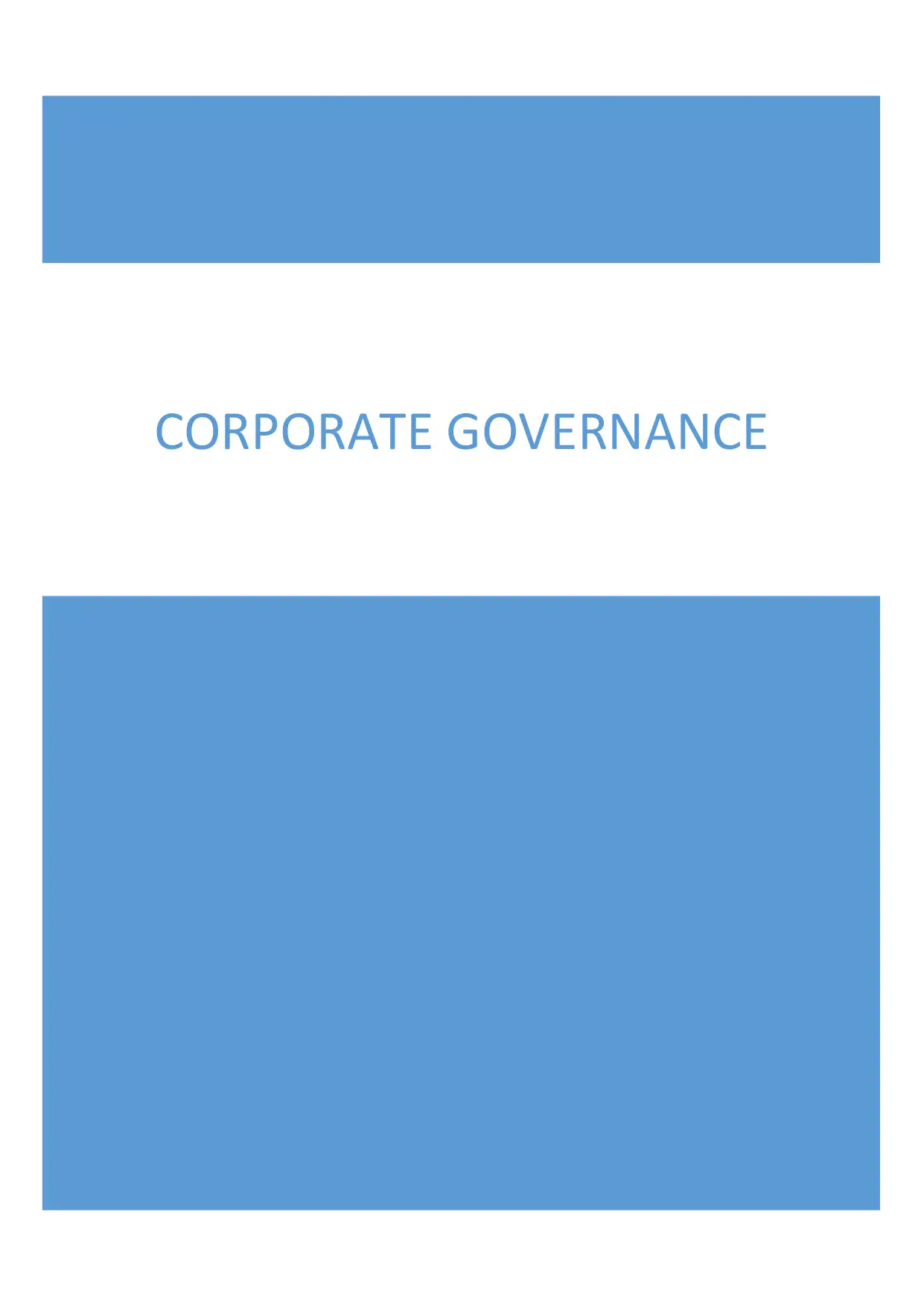
CORPORATE GOVERNANCE
Paraphrase This Document
Need a fresh take? Get an instant paraphrase of this document with our AI Paraphraser

Contents
Introduction...........................................................................................................................................2
Answer-1...............................................................................................................................................2
Answer-2...............................................................................................................................................4
Answer-3...............................................................................................................................................7
Conclusion.............................................................................................................................................9
References...........................................................................................................................................11
Introduction...........................................................................................................................................2
Answer-1...............................................................................................................................................2
Answer-2...............................................................................................................................................4
Answer-3...............................................................................................................................................7
Conclusion.............................................................................................................................................9
References...........................................................................................................................................11
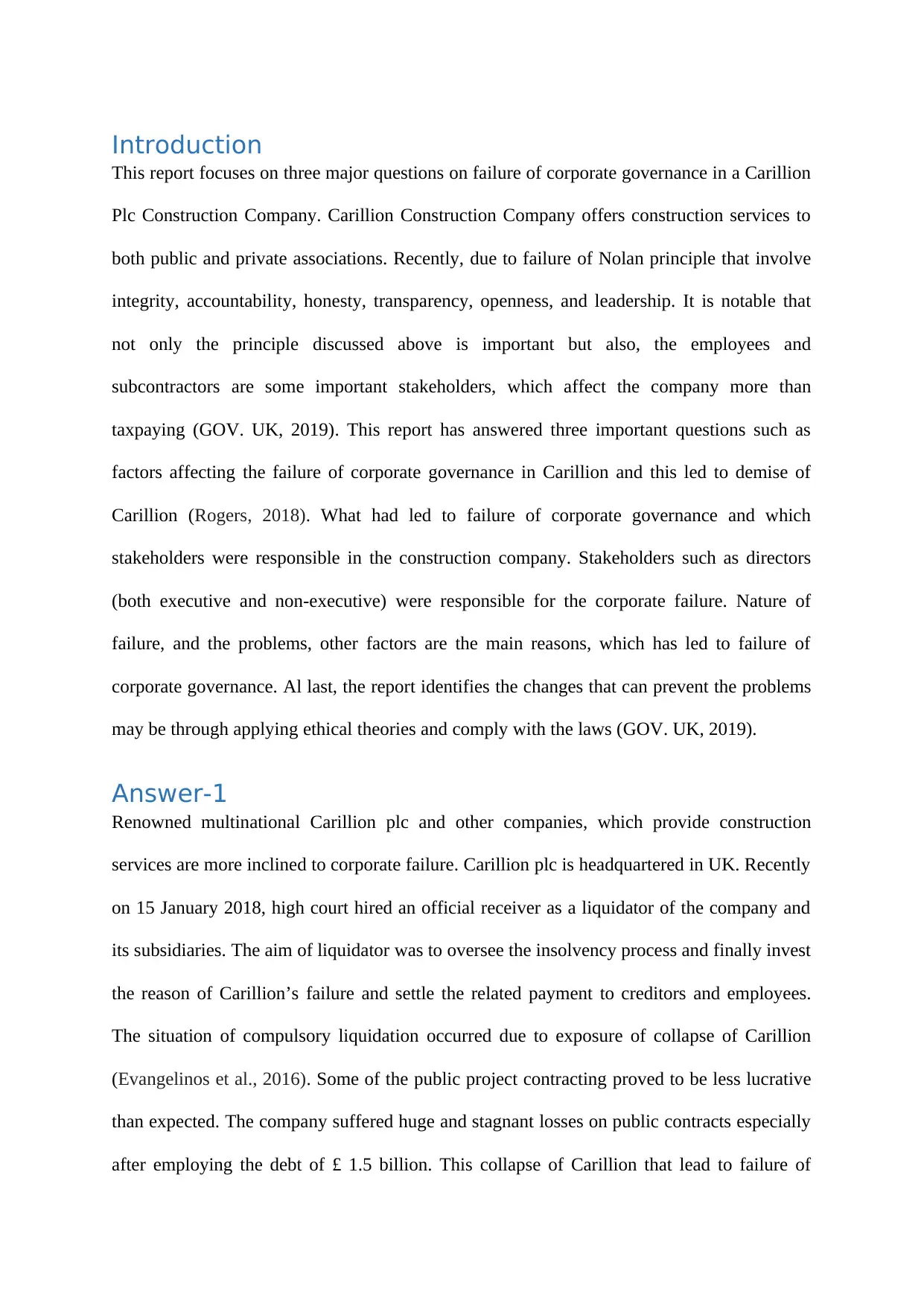
Introduction
This report focuses on three major questions on failure of corporate governance in a Carillion
Plc Construction Company. Carillion Construction Company offers construction services to
both public and private associations. Recently, due to failure of Nolan principle that involve
integrity, accountability, honesty, transparency, openness, and leadership. It is notable that
not only the principle discussed above is important but also, the employees and
subcontractors are some important stakeholders, which affect the company more than
taxpaying (GOV. UK, 2019). This report has answered three important questions such as
factors affecting the failure of corporate governance in Carillion and this led to demise of
Carillion (Rogers, 2018). What had led to failure of corporate governance and which
stakeholders were responsible in the construction company. Stakeholders such as directors
(both executive and non-executive) were responsible for the corporate failure. Nature of
failure, and the problems, other factors are the main reasons, which has led to failure of
corporate governance. Al last, the report identifies the changes that can prevent the problems
may be through applying ethical theories and comply with the laws (GOV. UK, 2019).
Answer-1
Renowned multinational Carillion plc and other companies, which provide construction
services are more inclined to corporate failure. Carillion plc is headquartered in UK. Recently
on 15 January 2018, high court hired an official receiver as a liquidator of the company and
its subsidiaries. The aim of liquidator was to oversee the insolvency process and finally invest
the reason of Carillion’s failure and settle the related payment to creditors and employees.
The situation of compulsory liquidation occurred due to exposure of collapse of Carillion
(Evangelinos et al., 2016). Some of the public project contracting proved to be less lucrative
than expected. The company suffered huge and stagnant losses on public contracts especially
after employing the debt of £ 1.5 billion. This collapse of Carillion that lead to failure of
This report focuses on three major questions on failure of corporate governance in a Carillion
Plc Construction Company. Carillion Construction Company offers construction services to
both public and private associations. Recently, due to failure of Nolan principle that involve
integrity, accountability, honesty, transparency, openness, and leadership. It is notable that
not only the principle discussed above is important but also, the employees and
subcontractors are some important stakeholders, which affect the company more than
taxpaying (GOV. UK, 2019). This report has answered three important questions such as
factors affecting the failure of corporate governance in Carillion and this led to demise of
Carillion (Rogers, 2018). What had led to failure of corporate governance and which
stakeholders were responsible in the construction company. Stakeholders such as directors
(both executive and non-executive) were responsible for the corporate failure. Nature of
failure, and the problems, other factors are the main reasons, which has led to failure of
corporate governance. Al last, the report identifies the changes that can prevent the problems
may be through applying ethical theories and comply with the laws (GOV. UK, 2019).
Answer-1
Renowned multinational Carillion plc and other companies, which provide construction
services are more inclined to corporate failure. Carillion plc is headquartered in UK. Recently
on 15 January 2018, high court hired an official receiver as a liquidator of the company and
its subsidiaries. The aim of liquidator was to oversee the insolvency process and finally invest
the reason of Carillion’s failure and settle the related payment to creditors and employees.
The situation of compulsory liquidation occurred due to exposure of collapse of Carillion
(Evangelinos et al., 2016). Some of the public project contracting proved to be less lucrative
than expected. The company suffered huge and stagnant losses on public contracts especially
after employing the debt of £ 1.5 billion. This collapse of Carillion that lead to failure of
⊘ This is a preview!⊘
Do you want full access?
Subscribe today to unlock all pages.

Trusted by 1+ million students worldwide
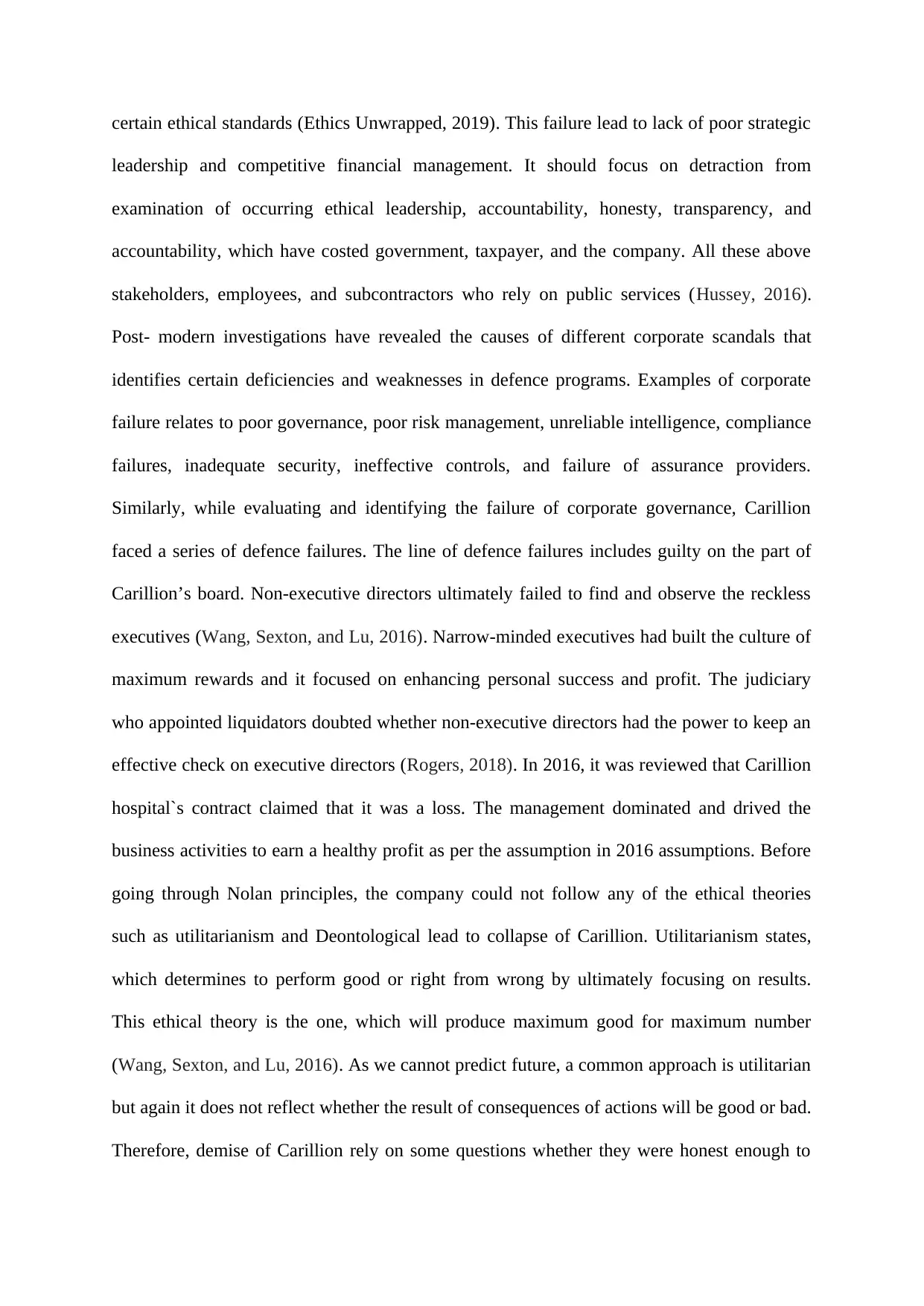
certain ethical standards (Ethics Unwrapped, 2019). This failure lead to lack of poor strategic
leadership and competitive financial management. It should focus on detraction from
examination of occurring ethical leadership, accountability, honesty, transparency, and
accountability, which have costed government, taxpayer, and the company. All these above
stakeholders, employees, and subcontractors who rely on public services (Hussey, 2016).
Post- modern investigations have revealed the causes of different corporate scandals that
identifies certain deficiencies and weaknesses in defence programs. Examples of corporate
failure relates to poor governance, poor risk management, unreliable intelligence, compliance
failures, inadequate security, ineffective controls, and failure of assurance providers.
Similarly, while evaluating and identifying the failure of corporate governance, Carillion
faced a series of defence failures. The line of defence failures includes guilty on the part of
Carillion’s board. Non-executive directors ultimately failed to find and observe the reckless
executives (Wang, Sexton, and Lu, 2016). Narrow-minded executives had built the culture of
maximum rewards and it focused on enhancing personal success and profit. The judiciary
who appointed liquidators doubted whether non-executive directors had the power to keep an
effective check on executive directors (Rogers, 2018). In 2016, it was reviewed that Carillion
hospital`s contract claimed that it was a loss. The management dominated and drived the
business activities to earn a healthy profit as per the assumption in 2016 assumptions. Before
going through Nolan principles, the company could not follow any of the ethical theories
such as utilitarianism and Deontological lead to collapse of Carillion. Utilitarianism states,
which determines to perform good or right from wrong by ultimately focusing on results.
This ethical theory is the one, which will produce maximum good for maximum number
(Wang, Sexton, and Lu, 2016). As we cannot predict future, a common approach is utilitarian
but again it does not reflect whether the result of consequences of actions will be good or bad.
Therefore, demise of Carillion rely on some questions whether they were honest enough to
leadership and competitive financial management. It should focus on detraction from
examination of occurring ethical leadership, accountability, honesty, transparency, and
accountability, which have costed government, taxpayer, and the company. All these above
stakeholders, employees, and subcontractors who rely on public services (Hussey, 2016).
Post- modern investigations have revealed the causes of different corporate scandals that
identifies certain deficiencies and weaknesses in defence programs. Examples of corporate
failure relates to poor governance, poor risk management, unreliable intelligence, compliance
failures, inadequate security, ineffective controls, and failure of assurance providers.
Similarly, while evaluating and identifying the failure of corporate governance, Carillion
faced a series of defence failures. The line of defence failures includes guilty on the part of
Carillion’s board. Non-executive directors ultimately failed to find and observe the reckless
executives (Wang, Sexton, and Lu, 2016). Narrow-minded executives had built the culture of
maximum rewards and it focused on enhancing personal success and profit. The judiciary
who appointed liquidators doubted whether non-executive directors had the power to keep an
effective check on executive directors (Rogers, 2018). In 2016, it was reviewed that Carillion
hospital`s contract claimed that it was a loss. The management dominated and drived the
business activities to earn a healthy profit as per the assumption in 2016 assumptions. Before
going through Nolan principles, the company could not follow any of the ethical theories
such as utilitarianism and Deontological lead to collapse of Carillion. Utilitarianism states,
which determines to perform good or right from wrong by ultimately focusing on results.
This ethical theory is the one, which will produce maximum good for maximum number
(Wang, Sexton, and Lu, 2016). As we cannot predict future, a common approach is utilitarian
but again it does not reflect whether the result of consequences of actions will be good or bad.
Therefore, demise of Carillion rely on some questions whether they were honest enough to
Paraphrase This Document
Need a fresh take? Get an instant paraphrase of this document with our AI Paraphraser
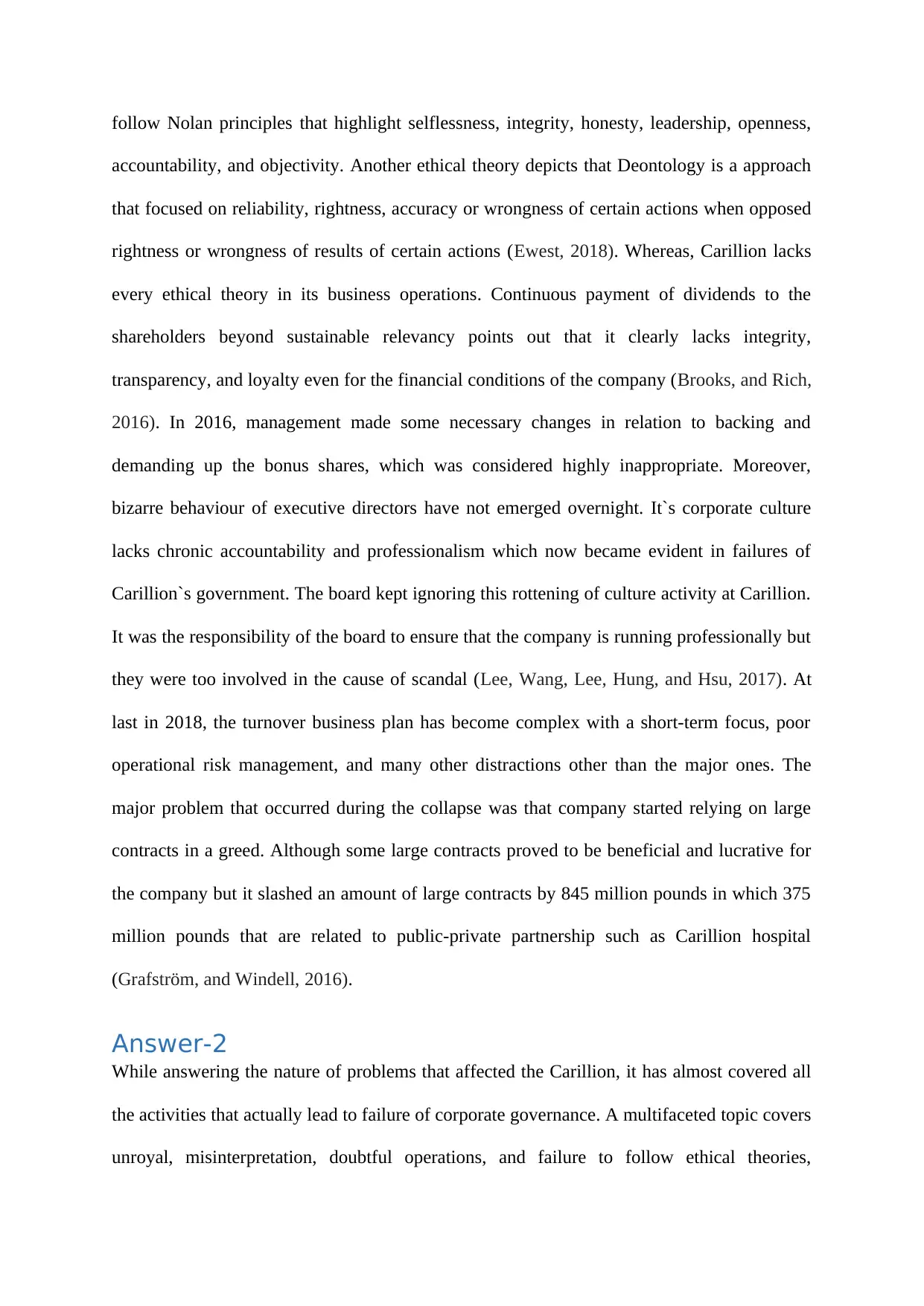
follow Nolan principles that highlight selflessness, integrity, honesty, leadership, openness,
accountability, and objectivity. Another ethical theory depicts that Deontology is a approach
that focused on reliability, rightness, accuracy or wrongness of certain actions when opposed
rightness or wrongness of results of certain actions (Ewest, 2018). Whereas, Carillion lacks
every ethical theory in its business operations. Continuous payment of dividends to the
shareholders beyond sustainable relevancy points out that it clearly lacks integrity,
transparency, and loyalty even for the financial conditions of the company (Brooks, and Rich,
2016). In 2016, management made some necessary changes in relation to backing and
demanding up the bonus shares, which was considered highly inappropriate. Moreover,
bizarre behaviour of executive directors have not emerged overnight. It`s corporate culture
lacks chronic accountability and professionalism which now became evident in failures of
Carillion`s government. The board kept ignoring this rottening of culture activity at Carillion.
It was the responsibility of the board to ensure that the company is running professionally but
they were too involved in the cause of scandal (Lee, Wang, Lee, Hung, and Hsu, 2017). At
last in 2018, the turnover business plan has become complex with a short-term focus, poor
operational risk management, and many other distractions other than the major ones. The
major problem that occurred during the collapse was that company started relying on large
contracts in a greed. Although some large contracts proved to be beneficial and lucrative for
the company but it slashed an amount of large contracts by 845 million pounds in which 375
million pounds that are related to public-private partnership such as Carillion hospital
(Grafström, and Windell, 2016).
Answer-2
While answering the nature of problems that affected the Carillion, it has almost covered all
the activities that actually lead to failure of corporate governance. A multifaceted topic covers
unroyal, misinterpretation, doubtful operations, and failure to follow ethical theories,
accountability, and objectivity. Another ethical theory depicts that Deontology is a approach
that focused on reliability, rightness, accuracy or wrongness of certain actions when opposed
rightness or wrongness of results of certain actions (Ewest, 2018). Whereas, Carillion lacks
every ethical theory in its business operations. Continuous payment of dividends to the
shareholders beyond sustainable relevancy points out that it clearly lacks integrity,
transparency, and loyalty even for the financial conditions of the company (Brooks, and Rich,
2016). In 2016, management made some necessary changes in relation to backing and
demanding up the bonus shares, which was considered highly inappropriate. Moreover,
bizarre behaviour of executive directors have not emerged overnight. It`s corporate culture
lacks chronic accountability and professionalism which now became evident in failures of
Carillion`s government. The board kept ignoring this rottening of culture activity at Carillion.
It was the responsibility of the board to ensure that the company is running professionally but
they were too involved in the cause of scandal (Lee, Wang, Lee, Hung, and Hsu, 2017). At
last in 2018, the turnover business plan has become complex with a short-term focus, poor
operational risk management, and many other distractions other than the major ones. The
major problem that occurred during the collapse was that company started relying on large
contracts in a greed. Although some large contracts proved to be beneficial and lucrative for
the company but it slashed an amount of large contracts by 845 million pounds in which 375
million pounds that are related to public-private partnership such as Carillion hospital
(Grafström, and Windell, 2016).
Answer-2
While answering the nature of problems that affected the Carillion, it has almost covered all
the activities that actually lead to failure of corporate governance. A multifaceted topic covers
unroyal, misinterpretation, doubtful operations, and failure to follow ethical theories,
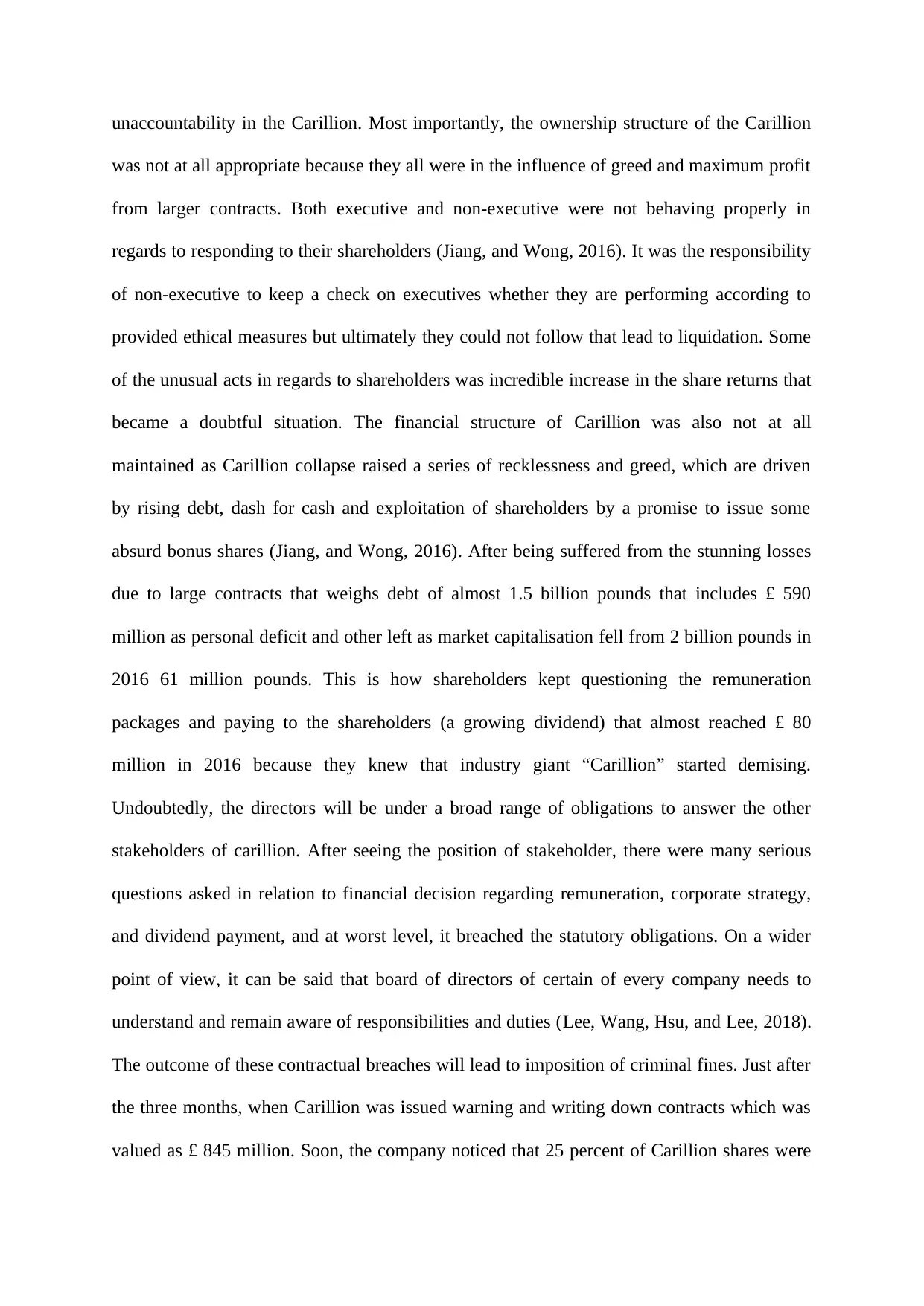
unaccountability in the Carillion. Most importantly, the ownership structure of the Carillion
was not at all appropriate because they all were in the influence of greed and maximum profit
from larger contracts. Both executive and non-executive were not behaving properly in
regards to responding to their shareholders (Jiang, and Wong, 2016). It was the responsibility
of non-executive to keep a check on executives whether they are performing according to
provided ethical measures but ultimately they could not follow that lead to liquidation. Some
of the unusual acts in regards to shareholders was incredible increase in the share returns that
became a doubtful situation. The financial structure of Carillion was also not at all
maintained as Carillion collapse raised a series of recklessness and greed, which are driven
by rising debt, dash for cash and exploitation of shareholders by a promise to issue some
absurd bonus shares (Jiang, and Wong, 2016). After being suffered from the stunning losses
due to large contracts that weighs debt of almost 1.5 billion pounds that includes £ 590
million as personal deficit and other left as market capitalisation fell from 2 billion pounds in
2016 61 million pounds. This is how shareholders kept questioning the remuneration
packages and paying to the shareholders (a growing dividend) that almost reached £ 80
million in 2016 because they knew that industry giant “Carillion” started demising.
Undoubtedly, the directors will be under a broad range of obligations to answer the other
stakeholders of carillion. After seeing the position of stakeholder, there were many serious
questions asked in relation to financial decision regarding remuneration, corporate strategy,
and dividend payment, and at worst level, it breached the statutory obligations. On a wider
point of view, it can be said that board of directors of certain of every company needs to
understand and remain aware of responsibilities and duties (Lee, Wang, Hsu, and Lee, 2018).
The outcome of these contractual breaches will lead to imposition of criminal fines. Just after
the three months, when Carillion was issued warning and writing down contracts which was
valued as £ 845 million. Soon, the company noticed that 25 percent of Carillion shares were
was not at all appropriate because they all were in the influence of greed and maximum profit
from larger contracts. Both executive and non-executive were not behaving properly in
regards to responding to their shareholders (Jiang, and Wong, 2016). It was the responsibility
of non-executive to keep a check on executives whether they are performing according to
provided ethical measures but ultimately they could not follow that lead to liquidation. Some
of the unusual acts in regards to shareholders was incredible increase in the share returns that
became a doubtful situation. The financial structure of Carillion was also not at all
maintained as Carillion collapse raised a series of recklessness and greed, which are driven
by rising debt, dash for cash and exploitation of shareholders by a promise to issue some
absurd bonus shares (Jiang, and Wong, 2016). After being suffered from the stunning losses
due to large contracts that weighs debt of almost 1.5 billion pounds that includes £ 590
million as personal deficit and other left as market capitalisation fell from 2 billion pounds in
2016 61 million pounds. This is how shareholders kept questioning the remuneration
packages and paying to the shareholders (a growing dividend) that almost reached £ 80
million in 2016 because they knew that industry giant “Carillion” started demising.
Undoubtedly, the directors will be under a broad range of obligations to answer the other
stakeholders of carillion. After seeing the position of stakeholder, there were many serious
questions asked in relation to financial decision regarding remuneration, corporate strategy,
and dividend payment, and at worst level, it breached the statutory obligations. On a wider
point of view, it can be said that board of directors of certain of every company needs to
understand and remain aware of responsibilities and duties (Lee, Wang, Hsu, and Lee, 2018).
The outcome of these contractual breaches will lead to imposition of criminal fines. Just after
the three months, when Carillion was issued warning and writing down contracts which was
valued as £ 845 million. Soon, the company noticed that 25 percent of Carillion shares were
⊘ This is a preview!⊘
Do you want full access?
Subscribe today to unlock all pages.

Trusted by 1+ million students worldwide
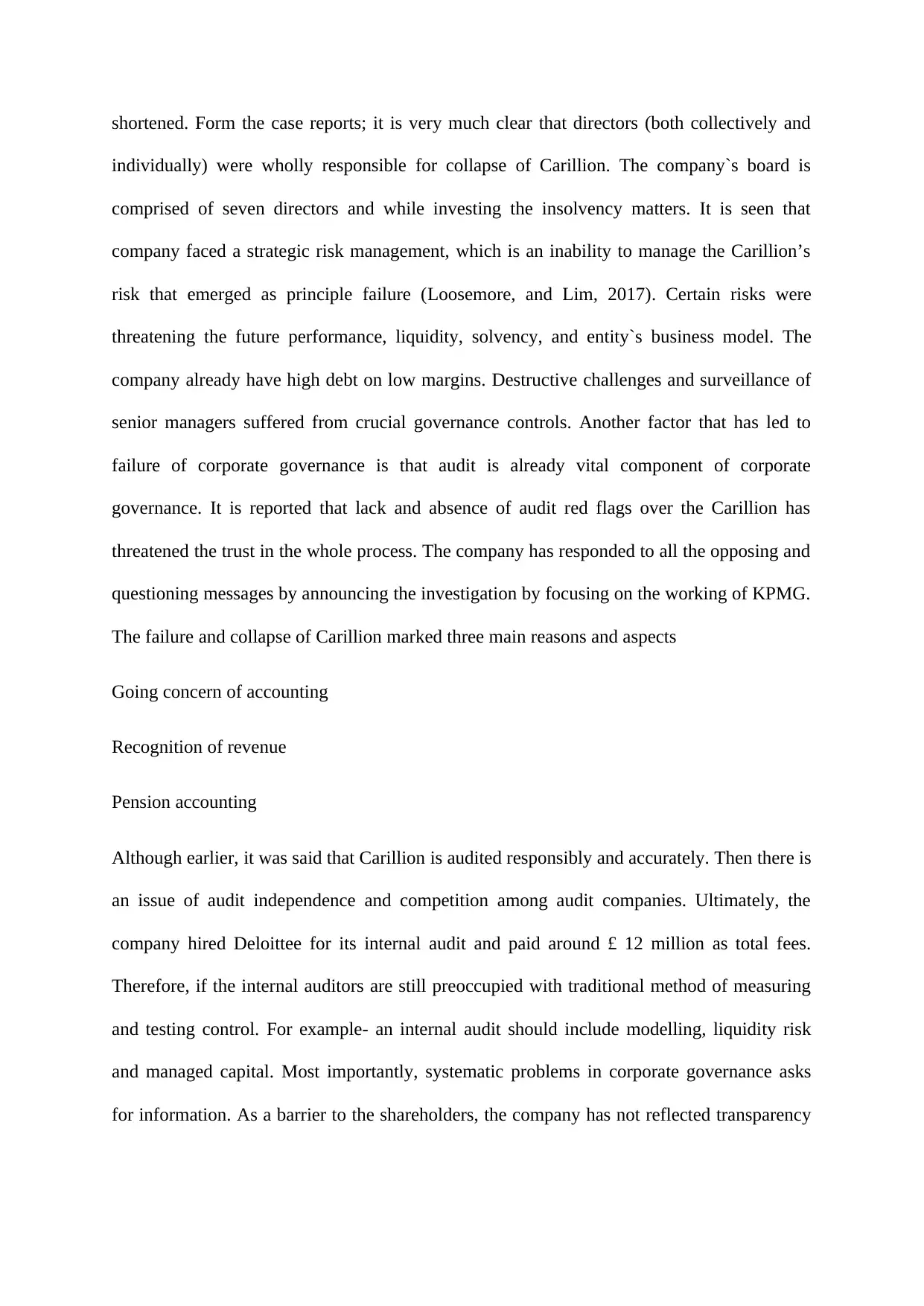
shortened. Form the case reports; it is very much clear that directors (both collectively and
individually) were wholly responsible for collapse of Carillion. The company`s board is
comprised of seven directors and while investing the insolvency matters. It is seen that
company faced a strategic risk management, which is an inability to manage the Carillion’s
risk that emerged as principle failure (Loosemore, and Lim, 2017). Certain risks were
threatening the future performance, liquidity, solvency, and entity`s business model. The
company already have high debt on low margins. Destructive challenges and surveillance of
senior managers suffered from crucial governance controls. Another factor that has led to
failure of corporate governance is that audit is already vital component of corporate
governance. It is reported that lack and absence of audit red flags over the Carillion has
threatened the trust in the whole process. The company has responded to all the opposing and
questioning messages by announcing the investigation by focusing on the working of KPMG.
The failure and collapse of Carillion marked three main reasons and aspects
Going concern of accounting
Recognition of revenue
Pension accounting
Although earlier, it was said that Carillion is audited responsibly and accurately. Then there is
an issue of audit independence and competition among audit companies. Ultimately, the
company hired Deloittee for its internal audit and paid around £ 12 million as total fees.
Therefore, if the internal auditors are still preoccupied with traditional method of measuring
and testing control. For example- an internal audit should include modelling, liquidity risk
and managed capital. Most importantly, systematic problems in corporate governance asks
for information. As a barrier to the shareholders, the company has not reflected transparency
individually) were wholly responsible for collapse of Carillion. The company`s board is
comprised of seven directors and while investing the insolvency matters. It is seen that
company faced a strategic risk management, which is an inability to manage the Carillion’s
risk that emerged as principle failure (Loosemore, and Lim, 2017). Certain risks were
threatening the future performance, liquidity, solvency, and entity`s business model. The
company already have high debt on low margins. Destructive challenges and surveillance of
senior managers suffered from crucial governance controls. Another factor that has led to
failure of corporate governance is that audit is already vital component of corporate
governance. It is reported that lack and absence of audit red flags over the Carillion has
threatened the trust in the whole process. The company has responded to all the opposing and
questioning messages by announcing the investigation by focusing on the working of KPMG.
The failure and collapse of Carillion marked three main reasons and aspects
Going concern of accounting
Recognition of revenue
Pension accounting
Although earlier, it was said that Carillion is audited responsibly and accurately. Then there is
an issue of audit independence and competition among audit companies. Ultimately, the
company hired Deloittee for its internal audit and paid around £ 12 million as total fees.
Therefore, if the internal auditors are still preoccupied with traditional method of measuring
and testing control. For example- an internal audit should include modelling, liquidity risk
and managed capital. Most importantly, systematic problems in corporate governance asks
for information. As a barrier to the shareholders, the company has not reflected transparency
Paraphrase This Document
Need a fresh take? Get an instant paraphrase of this document with our AI Paraphraser
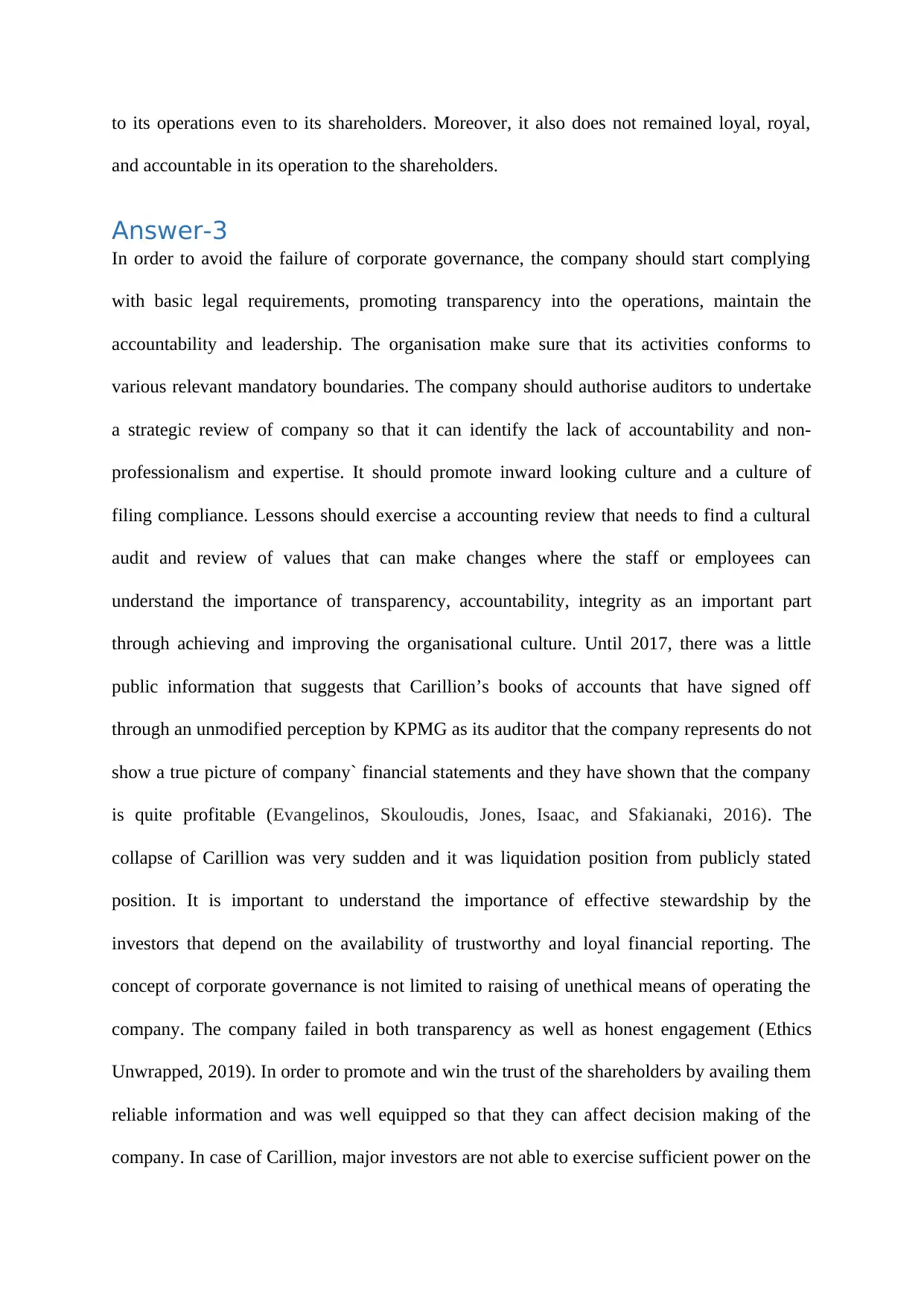
to its operations even to its shareholders. Moreover, it also does not remained loyal, royal,
and accountable in its operation to the shareholders.
Answer-3
In order to avoid the failure of corporate governance, the company should start complying
with basic legal requirements, promoting transparency into the operations, maintain the
accountability and leadership. The organisation make sure that its activities conforms to
various relevant mandatory boundaries. The company should authorise auditors to undertake
a strategic review of company so that it can identify the lack of accountability and non-
professionalism and expertise. It should promote inward looking culture and a culture of
filing compliance. Lessons should exercise a accounting review that needs to find a cultural
audit and review of values that can make changes where the staff or employees can
understand the importance of transparency, accountability, integrity as an important part
through achieving and improving the organisational culture. Until 2017, there was a little
public information that suggests that Carillion’s books of accounts that have signed off
through an unmodified perception by KPMG as its auditor that the company represents do not
show a true picture of company` financial statements and they have shown that the company
is quite profitable (Evangelinos, Skouloudis, Jones, Isaac, and Sfakianaki, 2016). The
collapse of Carillion was very sudden and it was liquidation position from publicly stated
position. It is important to understand the importance of effective stewardship by the
investors that depend on the availability of trustworthy and loyal financial reporting. The
concept of corporate governance is not limited to raising of unethical means of operating the
company. The company failed in both transparency as well as honest engagement (Ethics
Unwrapped, 2019). In order to promote and win the trust of the shareholders by availing them
reliable information and was well equipped so that they can affect decision making of the
company. In case of Carillion, major investors are not able to exercise sufficient power on the
and accountable in its operation to the shareholders.
Answer-3
In order to avoid the failure of corporate governance, the company should start complying
with basic legal requirements, promoting transparency into the operations, maintain the
accountability and leadership. The organisation make sure that its activities conforms to
various relevant mandatory boundaries. The company should authorise auditors to undertake
a strategic review of company so that it can identify the lack of accountability and non-
professionalism and expertise. It should promote inward looking culture and a culture of
filing compliance. Lessons should exercise a accounting review that needs to find a cultural
audit and review of values that can make changes where the staff or employees can
understand the importance of transparency, accountability, integrity as an important part
through achieving and improving the organisational culture. Until 2017, there was a little
public information that suggests that Carillion’s books of accounts that have signed off
through an unmodified perception by KPMG as its auditor that the company represents do not
show a true picture of company` financial statements and they have shown that the company
is quite profitable (Evangelinos, Skouloudis, Jones, Isaac, and Sfakianaki, 2016). The
collapse of Carillion was very sudden and it was liquidation position from publicly stated
position. It is important to understand the importance of effective stewardship by the
investors that depend on the availability of trustworthy and loyal financial reporting. The
concept of corporate governance is not limited to raising of unethical means of operating the
company. The company failed in both transparency as well as honest engagement (Ethics
Unwrapped, 2019). In order to promote and win the trust of the shareholders by availing them
reliable information and was well equipped so that they can affect decision making of the
company. In case of Carillion, major investors are not able to exercise sufficient power on the
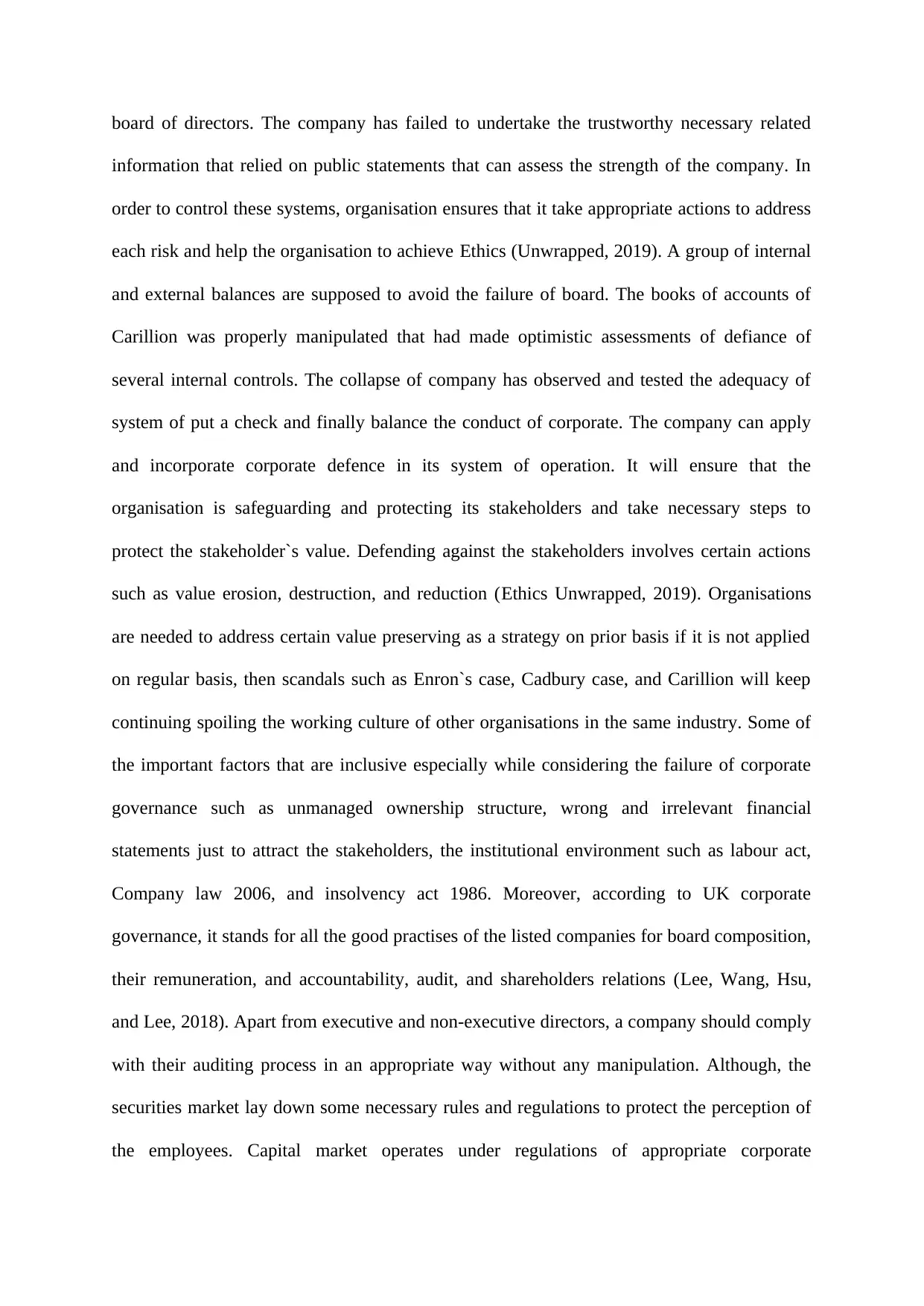
board of directors. The company has failed to undertake the trustworthy necessary related
information that relied on public statements that can assess the strength of the company. In
order to control these systems, organisation ensures that it take appropriate actions to address
each risk and help the organisation to achieve Ethics (Unwrapped, 2019). A group of internal
and external balances are supposed to avoid the failure of board. The books of accounts of
Carillion was properly manipulated that had made optimistic assessments of defiance of
several internal controls. The collapse of company has observed and tested the adequacy of
system of put a check and finally balance the conduct of corporate. The company can apply
and incorporate corporate defence in its system of operation. It will ensure that the
organisation is safeguarding and protecting its stakeholders and take necessary steps to
protect the stakeholder`s value. Defending against the stakeholders involves certain actions
such as value erosion, destruction, and reduction (Ethics Unwrapped, 2019). Organisations
are needed to address certain value preserving as a strategy on prior basis if it is not applied
on regular basis, then scandals such as Enron`s case, Cadbury case, and Carillion will keep
continuing spoiling the working culture of other organisations in the same industry. Some of
the important factors that are inclusive especially while considering the failure of corporate
governance such as unmanaged ownership structure, wrong and irrelevant financial
statements just to attract the stakeholders, the institutional environment such as labour act,
Company law 2006, and insolvency act 1986. Moreover, according to UK corporate
governance, it stands for all the good practises of the listed companies for board composition,
their remuneration, and accountability, audit, and shareholders relations (Lee, Wang, Hsu,
and Lee, 2018). Apart from executive and non-executive directors, a company should comply
with their auditing process in an appropriate way without any manipulation. Although, the
securities market lay down some necessary rules and regulations to protect the perception of
the employees. Capital market operates under regulations of appropriate corporate
information that relied on public statements that can assess the strength of the company. In
order to control these systems, organisation ensures that it take appropriate actions to address
each risk and help the organisation to achieve Ethics (Unwrapped, 2019). A group of internal
and external balances are supposed to avoid the failure of board. The books of accounts of
Carillion was properly manipulated that had made optimistic assessments of defiance of
several internal controls. The collapse of company has observed and tested the adequacy of
system of put a check and finally balance the conduct of corporate. The company can apply
and incorporate corporate defence in its system of operation. It will ensure that the
organisation is safeguarding and protecting its stakeholders and take necessary steps to
protect the stakeholder`s value. Defending against the stakeholders involves certain actions
such as value erosion, destruction, and reduction (Ethics Unwrapped, 2019). Organisations
are needed to address certain value preserving as a strategy on prior basis if it is not applied
on regular basis, then scandals such as Enron`s case, Cadbury case, and Carillion will keep
continuing spoiling the working culture of other organisations in the same industry. Some of
the important factors that are inclusive especially while considering the failure of corporate
governance such as unmanaged ownership structure, wrong and irrelevant financial
statements just to attract the stakeholders, the institutional environment such as labour act,
Company law 2006, and insolvency act 1986. Moreover, according to UK corporate
governance, it stands for all the good practises of the listed companies for board composition,
their remuneration, and accountability, audit, and shareholders relations (Lee, Wang, Hsu,
and Lee, 2018). Apart from executive and non-executive directors, a company should comply
with their auditing process in an appropriate way without any manipulation. Although, the
securities market lay down some necessary rules and regulations to protect the perception of
the employees. Capital market operates under regulations of appropriate corporate
⊘ This is a preview!⊘
Do you want full access?
Subscribe today to unlock all pages.

Trusted by 1+ million students worldwide
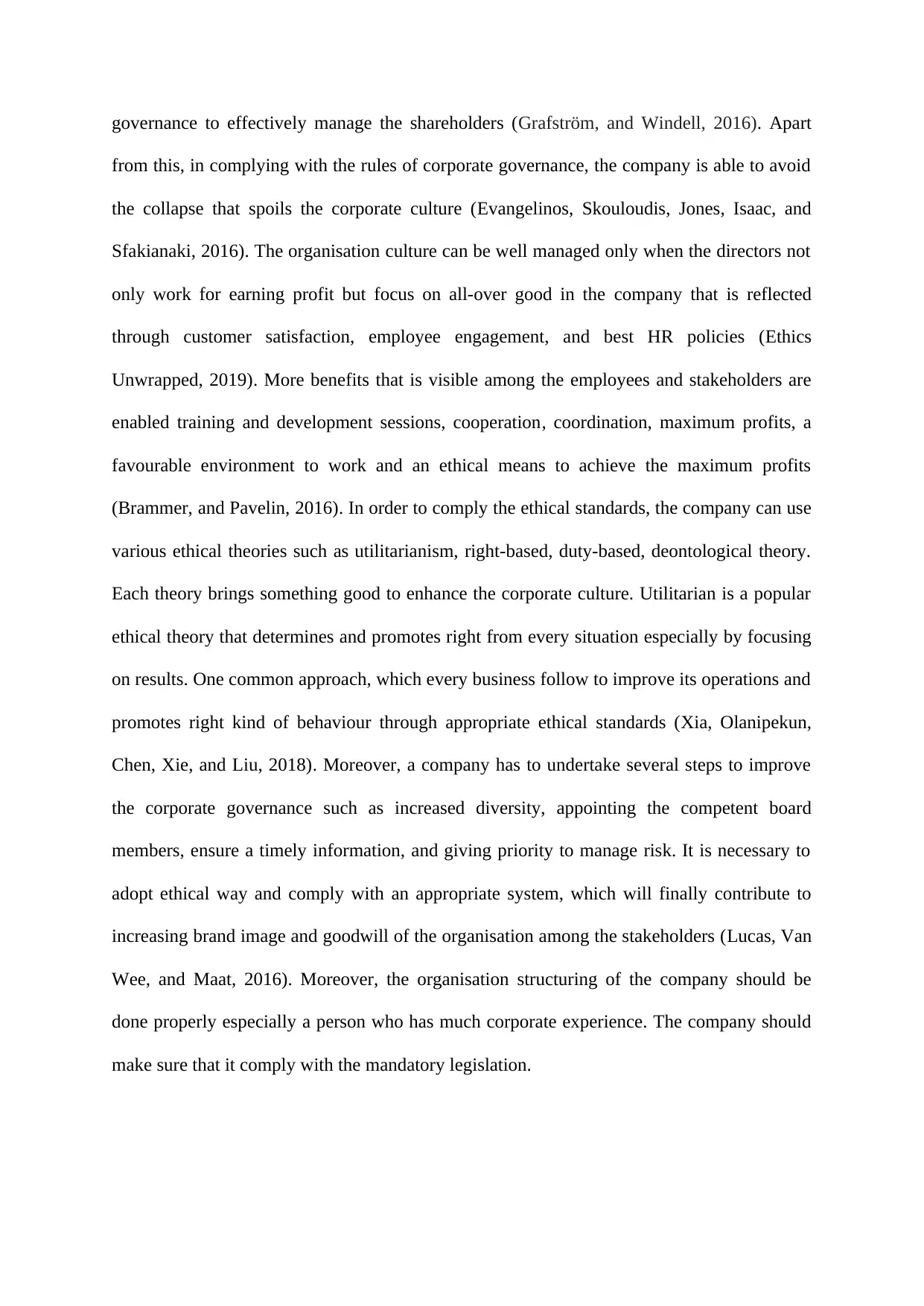
governance to effectively manage the shareholders (Grafström, and Windell, 2016). Apart
from this, in complying with the rules of corporate governance, the company is able to avoid
the collapse that spoils the corporate culture (Evangelinos, Skouloudis, Jones, Isaac, and
Sfakianaki, 2016). The organisation culture can be well managed only when the directors not
only work for earning profit but focus on all-over good in the company that is reflected
through customer satisfaction, employee engagement, and best HR policies (Ethics
Unwrapped, 2019). More benefits that is visible among the employees and stakeholders are
enabled training and development sessions, cooperation, coordination, maximum profits, a
favourable environment to work and an ethical means to achieve the maximum profits
(Brammer, and Pavelin, 2016). In order to comply the ethical standards, the company can use
various ethical theories such as utilitarianism, right-based, duty-based, deontological theory.
Each theory brings something good to enhance the corporate culture. Utilitarian is a popular
ethical theory that determines and promotes right from every situation especially by focusing
on results. One common approach, which every business follow to improve its operations and
promotes right kind of behaviour through appropriate ethical standards (Xia, Olanipekun,
Chen, Xie, and Liu, 2018). Moreover, a company has to undertake several steps to improve
the corporate governance such as increased diversity, appointing the competent board
members, ensure a timely information, and giving priority to manage risk. It is necessary to
adopt ethical way and comply with an appropriate system, which will finally contribute to
increasing brand image and goodwill of the organisation among the stakeholders (Lucas, Van
Wee, and Maat, 2016). Moreover, the organisation structuring of the company should be
done properly especially a person who has much corporate experience. The company should
make sure that it comply with the mandatory legislation.
from this, in complying with the rules of corporate governance, the company is able to avoid
the collapse that spoils the corporate culture (Evangelinos, Skouloudis, Jones, Isaac, and
Sfakianaki, 2016). The organisation culture can be well managed only when the directors not
only work for earning profit but focus on all-over good in the company that is reflected
through customer satisfaction, employee engagement, and best HR policies (Ethics
Unwrapped, 2019). More benefits that is visible among the employees and stakeholders are
enabled training and development sessions, cooperation, coordination, maximum profits, a
favourable environment to work and an ethical means to achieve the maximum profits
(Brammer, and Pavelin, 2016). In order to comply the ethical standards, the company can use
various ethical theories such as utilitarianism, right-based, duty-based, deontological theory.
Each theory brings something good to enhance the corporate culture. Utilitarian is a popular
ethical theory that determines and promotes right from every situation especially by focusing
on results. One common approach, which every business follow to improve its operations and
promotes right kind of behaviour through appropriate ethical standards (Xia, Olanipekun,
Chen, Xie, and Liu, 2018). Moreover, a company has to undertake several steps to improve
the corporate governance such as increased diversity, appointing the competent board
members, ensure a timely information, and giving priority to manage risk. It is necessary to
adopt ethical way and comply with an appropriate system, which will finally contribute to
increasing brand image and goodwill of the organisation among the stakeholders (Lucas, Van
Wee, and Maat, 2016). Moreover, the organisation structuring of the company should be
done properly especially a person who has much corporate experience. The company should
make sure that it comply with the mandatory legislation.
Paraphrase This Document
Need a fresh take? Get an instant paraphrase of this document with our AI Paraphraser
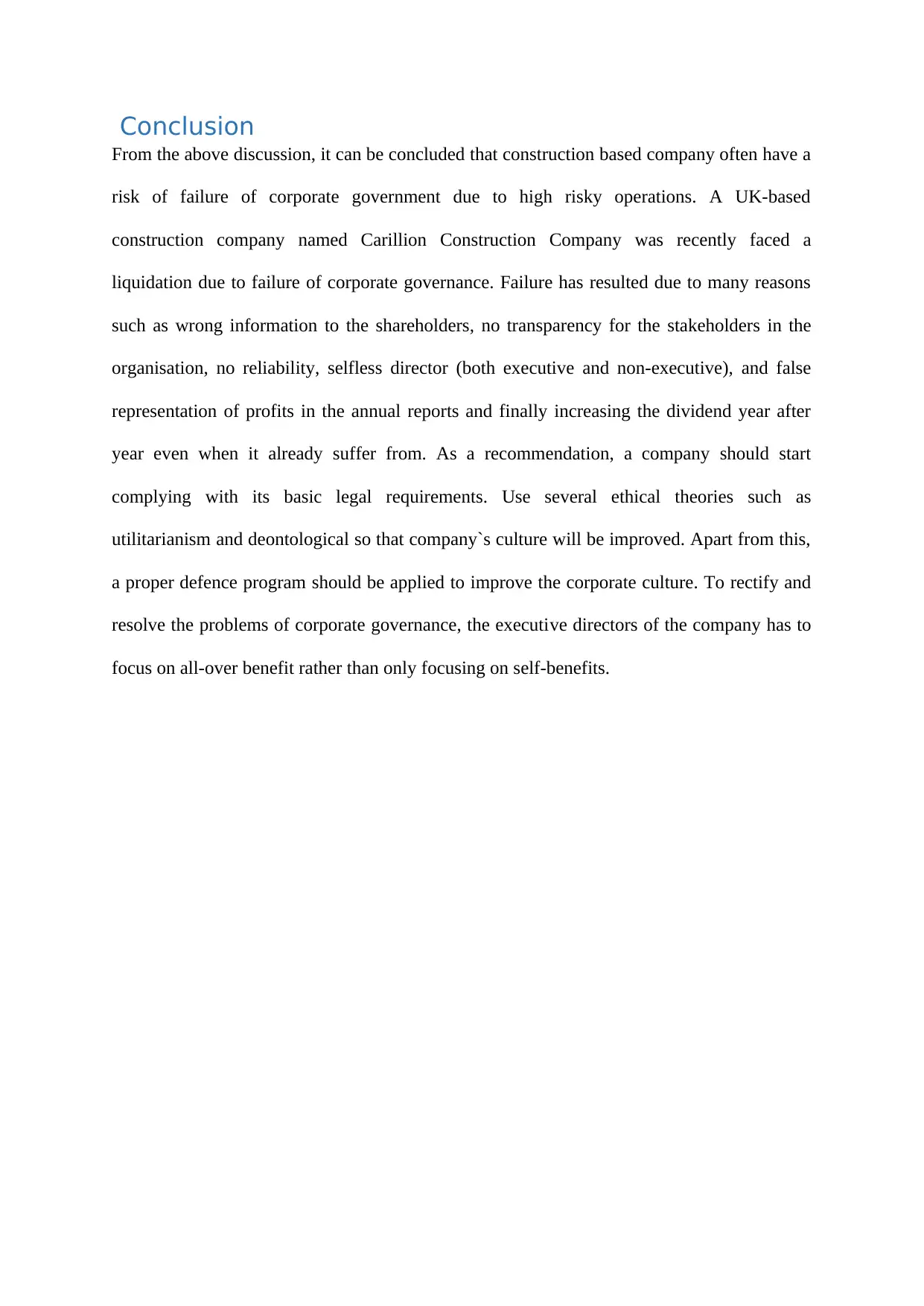
Conclusion
From the above discussion, it can be concluded that construction based company often have a
risk of failure of corporate government due to high risky operations. A UK-based
construction company named Carillion Construction Company was recently faced a
liquidation due to failure of corporate governance. Failure has resulted due to many reasons
such as wrong information to the shareholders, no transparency for the stakeholders in the
organisation, no reliability, selfless director (both executive and non-executive), and false
representation of profits in the annual reports and finally increasing the dividend year after
year even when it already suffer from. As a recommendation, a company should start
complying with its basic legal requirements. Use several ethical theories such as
utilitarianism and deontological so that company`s culture will be improved. Apart from this,
a proper defence program should be applied to improve the corporate culture. To rectify and
resolve the problems of corporate governance, the executive directors of the company has to
focus on all-over benefit rather than only focusing on self-benefits.
From the above discussion, it can be concluded that construction based company often have a
risk of failure of corporate government due to high risky operations. A UK-based
construction company named Carillion Construction Company was recently faced a
liquidation due to failure of corporate governance. Failure has resulted due to many reasons
such as wrong information to the shareholders, no transparency for the stakeholders in the
organisation, no reliability, selfless director (both executive and non-executive), and false
representation of profits in the annual reports and finally increasing the dividend year after
year even when it already suffer from. As a recommendation, a company should start
complying with its basic legal requirements. Use several ethical theories such as
utilitarianism and deontological so that company`s culture will be improved. Apart from this,
a proper defence program should be applied to improve the corporate culture. To rectify and
resolve the problems of corporate governance, the executive directors of the company has to
focus on all-over benefit rather than only focusing on self-benefits.
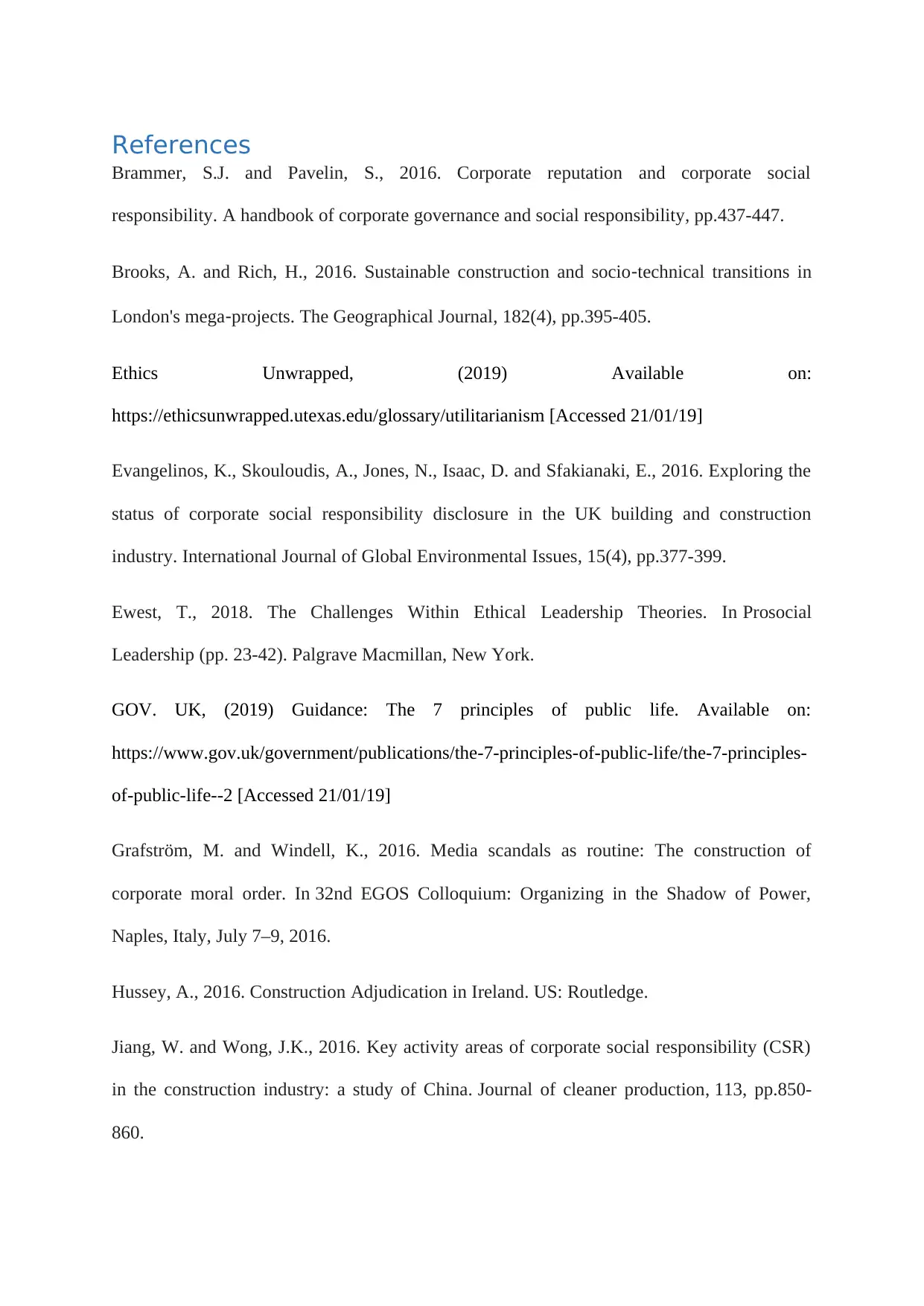
References
Brammer, S.J. and Pavelin, S., 2016. Corporate reputation and corporate social
responsibility. A handbook of corporate governance and social responsibility, pp.437-447.
Brooks, A. and Rich, H., 2016. Sustainable construction and socio‐technical transitions in
London's mega‐projects. The Geographical Journal, 182(4), pp.395-405.
Ethics Unwrapped, (2019) Available on:
https://ethicsunwrapped.utexas.edu/glossary/utilitarianism [Accessed 21/01/19]
Evangelinos, K., Skouloudis, A., Jones, N., Isaac, D. and Sfakianaki, E., 2016. Exploring the
status of corporate social responsibility disclosure in the UK building and construction
industry. International Journal of Global Environmental Issues, 15(4), pp.377-399.
Ewest, T., 2018. The Challenges Within Ethical Leadership Theories. In Prosocial
Leadership (pp. 23-42). Palgrave Macmillan, New York.
GOV. UK, (2019) Guidance: The 7 principles of public life. Available on:
https://www.gov.uk/government/publications/the-7-principles-of-public-life/the-7-principles-
of-public-life--2 [Accessed 21/01/19]
Grafström, M. and Windell, K., 2016. Media scandals as routine: The construction of
corporate moral order. In 32nd EGOS Colloquium: Organizing in the Shadow of Power,
Naples, Italy, July 7–9, 2016.
Hussey, A., 2016. Construction Adjudication in Ireland. US: Routledge.
Jiang, W. and Wong, J.K., 2016. Key activity areas of corporate social responsibility (CSR)
in the construction industry: a study of China. Journal of cleaner production, 113, pp.850-
860.
Brammer, S.J. and Pavelin, S., 2016. Corporate reputation and corporate social
responsibility. A handbook of corporate governance and social responsibility, pp.437-447.
Brooks, A. and Rich, H., 2016. Sustainable construction and socio‐technical transitions in
London's mega‐projects. The Geographical Journal, 182(4), pp.395-405.
Ethics Unwrapped, (2019) Available on:
https://ethicsunwrapped.utexas.edu/glossary/utilitarianism [Accessed 21/01/19]
Evangelinos, K., Skouloudis, A., Jones, N., Isaac, D. and Sfakianaki, E., 2016. Exploring the
status of corporate social responsibility disclosure in the UK building and construction
industry. International Journal of Global Environmental Issues, 15(4), pp.377-399.
Ewest, T., 2018. The Challenges Within Ethical Leadership Theories. In Prosocial
Leadership (pp. 23-42). Palgrave Macmillan, New York.
GOV. UK, (2019) Guidance: The 7 principles of public life. Available on:
https://www.gov.uk/government/publications/the-7-principles-of-public-life/the-7-principles-
of-public-life--2 [Accessed 21/01/19]
Grafström, M. and Windell, K., 2016. Media scandals as routine: The construction of
corporate moral order. In 32nd EGOS Colloquium: Organizing in the Shadow of Power,
Naples, Italy, July 7–9, 2016.
Hussey, A., 2016. Construction Adjudication in Ireland. US: Routledge.
Jiang, W. and Wong, J.K., 2016. Key activity areas of corporate social responsibility (CSR)
in the construction industry: a study of China. Journal of cleaner production, 113, pp.850-
860.
⊘ This is a preview!⊘
Do you want full access?
Subscribe today to unlock all pages.

Trusted by 1+ million students worldwide
1 out of 14
Related Documents
Your All-in-One AI-Powered Toolkit for Academic Success.
+13062052269
info@desklib.com
Available 24*7 on WhatsApp / Email
![[object Object]](/_next/static/media/star-bottom.7253800d.svg)
Unlock your academic potential
Copyright © 2020–2026 A2Z Services. All Rights Reserved. Developed and managed by ZUCOL.





